Summary Overview
Commodity Transportation and Backhaul opportunities in South Africa Market Overview:
The commodity transportation market in South Africa is experiencing gradual growth, driven by key industries such as mining, agriculture, manufacturing, and retail. The sector includes various transportation modes such as road, rail, and sea, playing a crucial role in the movement of goods across the country and beyond. This report offers a detailed analysis of procurement trends, focusing on optimizing transportation costs, managing backhaul opportunities, and leveraging technology to enhance logistics efficiency.
The market faces challenges related to fluctuating fuel prices, infrastructure limitations, and supply chain disruptions. However, the use of digital tools and strategic sourcing is becoming essential in optimizing the transportation network and ensuring cost-effective solutions. As demand for commodities continues to rise, businesses are increasingly adopting market intelligence to improve supply chain performance and mitigate risks.
The commodity transportation market in South Africa is expected to continue its growth trajectory until 2032, with the following key highlights:
Market Size: The commodity transportation sector in South Africa is projected to reach USD 19.9 billion 2032, growing at a CAGR of approximately 6.29 % from 2024 to 2032.
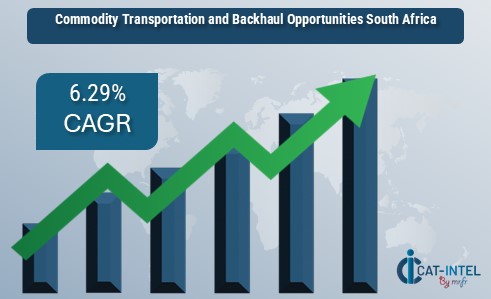
-
Sector Contributions: The market's growth is primarily driven by: -
Mining Industry: South Africa’s mining sector is a key contributor to the demand for transportation services, with the need for efficient transport of raw materials like coal, gold, and diamonds. -
Agriculture and Export Demand: The country’s agricultural output and export requirements necessitate reliable transportation of goods such as fruits, vegetables, and grains. -
Manufacturing and Retail: The growing demand for consumer goods is fuelling the need for fast and reliable logistics solutions. -
Technological Transformation and Innovations: Advances in logistics technology, such as real-time tracking, GPS systems, and data-driven route optimization, are improving operational efficiency and reducing transportation costs. -
Investment Initiatives: Companies are investing in expanding and modernizing transportation fleets, infrastructure upgrades, and adopting automation in logistics operations to improve speed and reduce costs. -
Regional Insights: South Africa remains a major hub for trade in sub-Saharan Africa, with the port cities of Durban and Cape Town serving as significant gateways for both imports and exports.
Key Trends and Sustainability Outlook:
-
Increased Digital Integration: The adoption of digital platforms and software solutions for logistics management is enhancing route planning, reducing delays, and increasing visibility throughout the supply chain. -
Environmental Concerns: As global sustainability initiatives grow, there is a focus on reducing carbon emissions in the transportation sector by adopting cleaner technologies and alternative fuels. -
Optimization of Backhaul Opportunities: Companies are focusing on improving the efficiency of backhaul transportation, ensuring better utilization of empty return trips, which can significantly reduce overall transportation costs. -
Customization in Logistics: Growing demand for tailored transportation solutions, especially in sectors like mining, agriculture, and manufacturing, is driving the need for more specialized services.
Growth Drivers:
-
Mining Sector Demand: Ongoing extraction activities in the mining industry continue to fuel demand for specialized transportation services. -
Agricultural Export Growth: The rise in agricultural exports is contributing significantly to the demand for logistics services. -
Infrastructure Development: Investment in transportation infrastructure, such as road improvements and rail expansions, is supporting the growth of the commodity transportation market. -
Sustainability Focus: The transportation industry is aligning with global trends toward sustainability by adopting green solutions and reducing emissions. -
Cost Efficiency through Backhaul: Increasing focus on backhaul opportunities, where transport vehicles are utilized for return trips, is reducing operational costs and optimizing logistics efficiency.
Overview of Market Intelligence Services for the Commodity Transportation and Backhaul Opportunities South Africa Market:
Recent analyses have revealed challenges such as fluctuating fuel prices, regulatory changes, and the complexity of managing diverse transportation modes. Market intelligence reports provide valuable insights into procurement opportunities, helping companies identify cost-saving measures, enhance supply chain resilience, and improve vendor management. These reports also assist organizations in maintaining compliance with regulatory standards and improving operational efficiency.
Procurement Intelligence for Commodity Transportation and Backhaul Opportunities South Africa: Category Management and Strategic Sourcing:
To maintain competitiveness in the commodity transportation market, businesses are optimizing their procurement processes through spend analysis, effective vendor management, and strategic sourcing. Utilizing market intelligence allows companies to better track transportation costs, improve backhaul strategies, and streamline logistics operations. By leveraging actionable insights, organizations can develop procurement strategies that ensure cost-effective, efficient, and reliable transportation services, ultimately driving long-term success in the market.
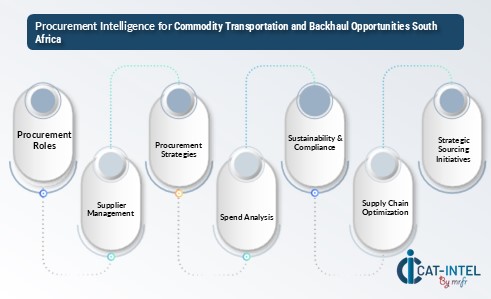
Pricing Outlook for Commodity Transportation and Backhaul Opportunities in South Africa: Spend Analysis.
The pricing outlook for commodity transportation in South Africa is expected to remain relatively stable, although fluctuations will occur due to several influencing factors. Variations in fuel prices, transportation labor costs, regulatory changes, and infrastructure development can significantly impact the cost trends. Additionally, increasing demand for commodities in sectors such as mining, agriculture, and retail is putting upward pressure on transportation costs.
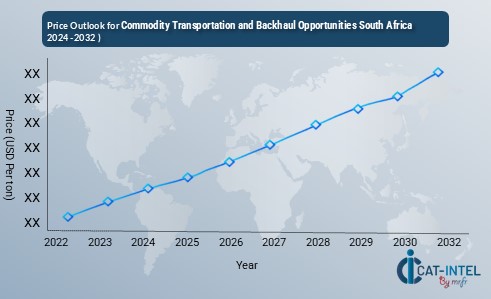
Graph shows general upward trend pricing for commodity transportation & backhaul in south Africa and growing demand. However, there may be fluctuations influenced by economic conditions, technological advancements, and competitive dynamic.
Efforts to enhance supply chain efficiency, optimize route planning, and improve fleet management will be critical for controlling costs. Investments in technology, such as real-time tracking systems, automated scheduling, and data-driven logistics optimization, will help address these pricing challenges.
Collaborating with transportation providers, diversifying sourcing strategies, and utilizing market insights through digital platforms are vital for controlling transportation expenses. Despite these challenges, a focus on sustainability, cost-effective logistics solutions, and innovation will play an essential role in managing pricing dynamics effectively.
Cost Breakdown for Commodity Transportation and Backhaul Opportunities South Africa: Total Cost of Ownership (TCO) and Cost-Saving Opportunities
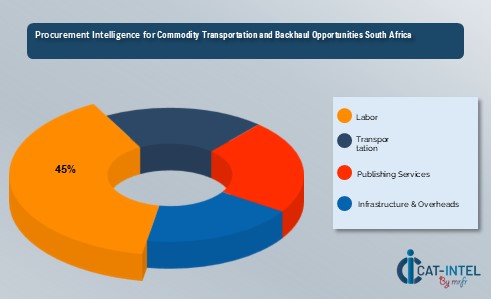
- Transportation: (45%)
- Description: The costs include the purchase of fuel, maintenance of transport vehicles, and expenses related to vehicle leasing or ownership. transportation costs also cover environmental management efforts related to emissions and fuel consumption.
- Trends: Growing investment in fuel-efficient vehicles, adoption of alternative fuels such as biofuels, and the push toward electric vehicles in transportation fleets to reduce long-term fuel costs.
- Labor (XX%)
- Publishing Services (XX%)
- Infrastructure & Overheads (XX%)
Cost-Saving Opportunities: Negotiation Levers and Purchasing Strategies
In the commodity transportation sector in South Africa, strategic procurement and efficient logistics management can result in substantial cost savings and improved supply chain optimization. Building long-term relationships with transport providers, fleet operators, and warehousing partners can help secure competitive pricing, minimize operational costs, and enhance logistical efficiency. Collaborative agreements with trucking companies, rail operators, and port authorities offer benefits like flexible payment terms, scalable service options, and cost-effective handling and shipping solutions.
Investments in technology, such as fleet management systems, route optimization software, and automated logistics tools, can significantly reduce operational costs, improve fuel efficiency, and streamline transportation processes. Additionally, adopting sustainability practices, such as optimizing fuel consumption and reducing emissions, can lower long-term procurement costs. Multi-sourcing strategies, including diversifying transportation partners and utilizing competitive bidding, can mitigate supply chain risks related to fuel price volatility and help strengthen negotiating positions with service providers.
Supply and Demand Overview for Commodity Transportation & Backhaul in South Africa: Demand-Supply Dynamics and Buyer Intelligence for Effective Supplier Relationship Management (SRM)
The commodity transportation market in South Africa is experiencing steady growth, driven by strong demand in key industries such as mining, agriculture, manufacturing, and retail. The balance of supply and demand is influenced by various factors, including fuel costs, infrastructure development, technological advances, and regulatory conditions.
Demand Factors:
-
Mining Industry Growth: The continued expansion of South Africa's mining sector, including coal, gold, and other minerals, significantly drives the demand for transportation services, especially for bulk commodities. -
Agricultural Exports: The growing demand for South African agricultural products in international markets is boosting the need for reliable transportation solutions, particularly in road and rail logistics. -
Retail and Consumer Goods: As the retail sector expands, there is a need for efficient transportation of goods to meet consumer demand, creating higher transportation requirements. -
Infrastructure Expansion: Investment in infrastructure development, including road improvements and port expansions, is driving increased demand for transportation services to support the construction and retail sectors.
Supply Factors:
-
Fuel Costs: As a key factor in transportation pricing, fluctuating fuel costs can significantly affect the stability of the transportation supply chain. Maintaining fuel efficiency through better route management and vehicle optimization is crucial. -
Infrastructure Capacity: The availability and capacity of transport infrastructure, such as roads, railways, and ports, directly impact the ability to meet demand. Investments in upgrading and expanding this infrastructure are essential for ensuring a smooth supply. -
Geopolitical and Regulatory Risks: The political landscape and regulatory challenges, particularly in cross-border transportation, can influence the availability and cost of transportation services. Compliance with local regulations and international trade agreements is critical to avoid disruptions. -
Fleet and Service Capacity: The capacity of transportation fleets and logistics companies to scale services in response to fluctuating demand plays a key role in maintaining a stable supply of transportation services.
Regional Demand-Supply Outlook: Commodity Transportation and Backhaul Opportunities in South Africa
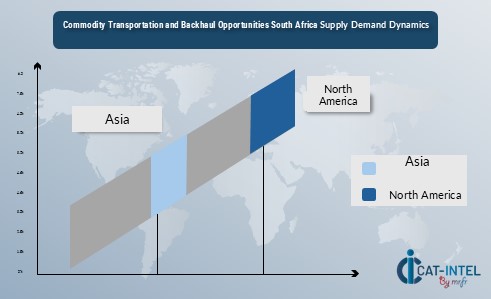
The Image shows growing demand for commodity transportation & backhaul opportunities south Africa in both Gauteng and KwaZulu Natal with potential price increases and increased Competition.
Africa (South Africa): Dominance in Commodity Transportation
South Africa’s commodity transportation market, Gauteng and KwaZulu-Natal playing a central role in the logistics of bulk goods, agricultural products, and industrial commodities. These provinces are expected to continue driving the demand for transportation services, influenced by the following factors:
-
Mining and Export Activity: Gauteng, with its proximity to key mining hubs, and KwaZulu-Natal, with its access to major ports, are vital to the transportation of minerals and coal, which are core to the economy. -
Agricultural Exports: KwaZulu-Natal, known for its agricultural output, particularly in sugar, citrus, and forestry, drives the need for robust transportation solutions to move products to local and international markets. -
Infrastructure and Industrial Growth: Gauteng, as the industrial heartland of South Africa, houses key manufacturing plants and retail hubs, spurring demand for efficient transportation of raw materials and finished goods. -
Port and Rail Connectivity: KwaZulu-Natal benefits from key port cities like Durban, one of the largest and busiest ports in Africa, while Gauteng serves as a hub for both road and rail networks that are essential for the efficient movement of goods across the region.
South Africa Remains a key hub, Commodity Transportation and Backhaul Opportunities in South Africa price drivers Innovation and Growth.
Supplier Landscape: Supplier Negotiations and Strategies
The supplier landscape in South Africa’s commodity transportation and backhaul market is highly competitive, with a mix of large, established logistics providers and smaller, specialized companies focusing on specific segments of the supply chain. These suppliers play a key role in determining important market factors, including pricing, transportation capacity, service reliability, and the overall quality of logistics services. The market is composed of both global players with a wide range of services across various sectors and niche providers specializing in specific solutions, such as backhaul optimization, sustainable logistics, or specialized freight handling.
While major logistics companies dominate the supply chain, emerging players are increasingly focusing on specific market segments, such as optimizing backhaul routes, reducing fuel consumption, or providing customized transportation services. Furthermore, a growing emphasis on sustainability, regulatory compliance, and transparency is pushing suppliers to adapt their operations to meet the increasing demand for efficient, eco-friendly, and cost-effective transportation solutions.
Key Suppliers in the Commodity Transportation Market Include:
- Transnet Freight Rail
- Imperial Logistics
- DHL South Africa
- Tata Africa
- Bidvest Panalpina Logistics
- XPO Logistics
- Grindrod Limited
- Kuehne + Nagel
- Murray & Roberts
- Cargo Carriers
Significant Development |
Description |
Market Growth |
The commodity transportation sector in South Africa is experiencing steady growth, driven by increased demand from industries like mining, agriculture, and retail, as well as expanding infrastructure projects. |
Sustainable Practices |
There is a growing focus on adopting eco-friendly transportation solutions, such as fuel-efficient vehicles, emissions reduction, and sustainable backhaul strategies, in line with South Africa’s environmental and regulatory standards. |
Service Diversification |
Expansion of logistics services to include specialized transportation solutions, such as temperature-controlled goods transport, backhaul optimization, and last-mile delivery, catering to industries like agriculture and manufacturing. |
Technological Innovations |
The use of advanced technologies, such as GPS tracking, route optimization software, and automated fleet management systems, is enhancing transportation efficiency, reducing costs, and improving service delivery. |
E-commerce Expansion |
The growth of e-commerce is boosting demand for reliable and efficient transportation networks to support the fast movement of goods, particularly in urban areas and through last-mile delivery services. |
Focus on Efficiency |
Rising demand for cost-effective and efficient transportation methods, including better load optimization, fuel management, and backhaul coordination, is streamlining operations and improving supply chain performance. |
|
Commodity Transportation and Backhaul Opportunities in South Africa Attribute/Metric |
Details |
Commodity Transportation Market Sizing |
The commodity transportation sector in South Africa is projected to reach USD 19.9 billion 2032, growing at a CAGR of approximately 6.29% from 2024 to 2032. |
Technology Commodity Transportation Adoption Rate |
Approximately 35% of companies in the transportation sector are integrating advanced technologies such as route optimization software, GPS tracking, and automated fleet management to improve efficiency and reduce operational costs. |
Top Commodity Transportation Strategies for 2024 |
Focus on enhancing logistics efficiency, investing in sustainable fuel options, adopting digital platforms for tracking and optimizing backhaul, and improving road infrastructure to cater to growing industrial needs. |
Process Commodity Transportation Automation in Transport |
Around 25% of logistics and transportation firms in South Africa have implemented automation in areas such as route planning, load optimization, and real-time fleet monitoring to streamline operations and minimize costs. |
Market Challenges |
Key challenges include road infrastructure constraints, fluctuating fuel prices, inefficiencies in backhaul operations, and the need for sustainable transportation solutions in line with environmental regulations. |
Key Suppliers |
Leading players in the South African commodity transportation market include Transnet Freight Rail, Imperial Logistics, DHL South Africa, and Grindrod, offering transportation, logistics, and backhaul solutions across industries. |
Key Regions Covered |
The commodity transportation market is centered in regions like Gauteng and KwaZulu-Natal, with significant demand driven by mining, agriculture, and infrastructure projects in these provinces. |
Market Drivers and Trends |
Growth is driven by increasing demand for transportation services in mining, agriculture, and retail, as well as investments in infrastructure, advancements in logistics technology, and a rising focus on sustainability in transport. |










